We use cookies to improve your experience. By accepting you agree to our cookie policy
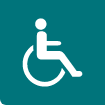
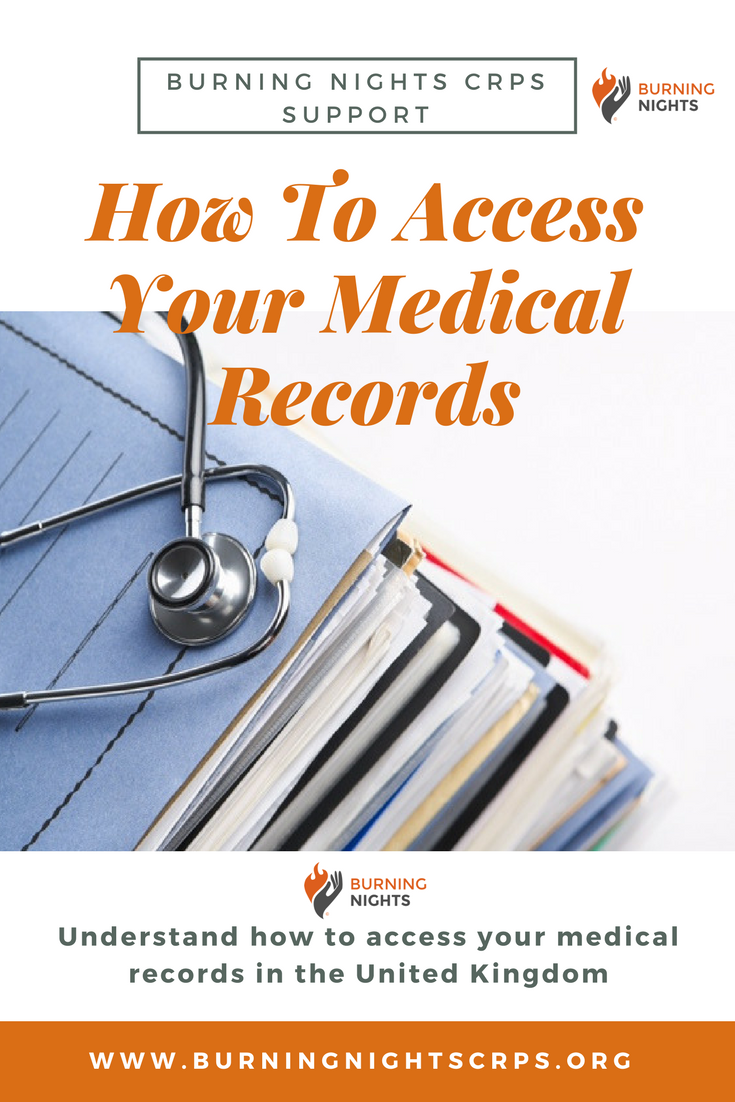
Everyone who is registered with the NHS in England, Wales and the Isle of Man will have an NHS Number which is an exclusive number that identifies you as a patient. When you first ever register with a GP you should receive from the Practice, a registration letter that will contain your NHS Number.
This NHS Number will then continue with you throughout your life while you remain in the UK. Even if you change GP practices, you will keep the same NHS Number. Your NHS Number is completely unique and personal to you. No-one else will have the exact same number as you.
Every NHS Number is made up of 10 digits which will be shown in a 3-3-4 format, usually for example 123 123 1234 (this is an example only).
Your unique NHS Number will then help healthcare providers and staff to correctly identify you and then can match your medical or health records to you. You don’t need to know your NHS Number and according to NHS Choices “you should not be denied care on the basis you do not know, or do not have, an NHS Number.” If you can’t find your NHS Number at home, please contact your GP practice that you’re registered with as they should be able to help you.
If you wish to book any hospital appointments via the online NHS e-Referral Service i.e. Choose and Book or register for the Electronic Prescription Service then you will need your NHS Number. If you can’t remember it or don’t know it please check any official documents that you’ve received from the hospital or GP practice as your number should be shown on there.
When you receive letters and documents from the NHS most of them will include your unique NHS Number on them. This will include for example your prescriptions, hospital/medical tests and the results, letters from hospitals to your GP, hospital appointment/cancellation letters as well as other health records you may have requested access to.
It is important to note that medical cards are no longer issued in England. You may still have one which has the old NHS Number style which was made up of both numbers and letters. However these have since been replaced to the new style NHS Number which is the 10 digit number only style.
NHS Scotland’s equivalent to the NHS England NHS Number is called a CHI number or Community Health Index. The CHI Number is a 10 (ten) digit number similar to the ones used in NHS England, Wales and Isle of Man. This 10 digit CHI Number is usually made up from the patient’s date of birth (as DDMMYY), followed by 4 (four) digits which are made from 2 (two) digits randomly produced, the 3rd (third) digit identifying the gender at birth (odd for men, even for women) and a check digit.
There is a similar system used in Northern Ireland with each one of the three using the same format but with non-overlapping number blocks, thereby preventing the issue of the same number by more than one system.
Every time you go to an NHS service in England including your GP, hospital, consultant / specialist or dentist, a medical record which is also known as a health record, is created about you. They will include details such as the time, date, purpose for your visit, treatment, allergies, medication, test results, x-rays, scans, the notes from the appointment or visit as well as any letters that have been written to other doctors, hospitals, dentists etc.
Therefore because these records have been created by various different services, clinics, doctors etc. the medical information held about you will be in various places such as your hospital, GP practice, dental practice, optician, or specialist service. However your GP records contain almost all of your medical information.
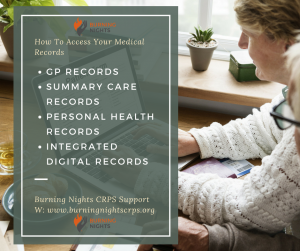 There are 4 main types of medical or health records in England:
There are 4 main types of medical or health records in England:
According to NHS England, your medical or health records should contain all the important and necessary information about the health care you have received. Your medical records can then be accessed by healthcare professionals. For example if you have had any x-rays or scans, then these would be included in your medical records.
NHS England say the information in your records can include the following:
(via NHS England “Health Records”)
As mentioned above, your GP record is where almost all of your medical information is held if you are registered with a GP practice. Information can include:
Medical records are kept for different amounts of time; therefore it depends on the type of record as to how long it is kept for.
For GP medical (health) records, they should be kept until 10 (ten) years after the patient has died or after they have permanently left the country unless they remain in the European Union (EU). Any electronic GP records held about you, must not be deleted or destroyed for the foreseeable future.
There are strict guidelines that cover all the different types of health records and those guidelines will specify the minimum time length that those records should be kept for. To find out all the information on these guidelines about minimum time lengths to keep medical records please visit the Records Management Code of Practice for Health & Social Care on the NHS Digital website – records management code of practice. (See Cited Resources Below)
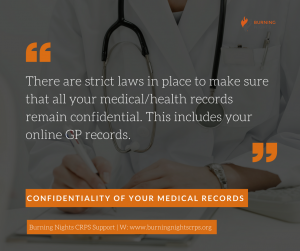 You may be wondering who can see your medical records. As you may gather there is a lot of personal information that is available, however there are strict laws in place to make sure that all your medical/health records remain confidential. This includes your online GP records. Your health Records can only be accessed by health professionals who are involved in your care. Your online GP records cannot be shared with anyone without your express permission.
You may be wondering who can see your medical records. As you may gather there is a lot of personal information that is available, however there are strict laws in place to make sure that all your medical/health records remain confidential. This includes your online GP records. Your health Records can only be accessed by health professionals who are involved in your care. Your online GP records cannot be shared with anyone without your express permission.
The main 2 laws that are involved and are important are the Data Protection Act (DPA) 1998 and Human Rights Act (HRA) 1998. The NHS are an organisation which is bound by the terms of the DPA 1998 and they must ensure certain criteria are followed i.e. your personal information is kept secure and it’s only used for certain stated purposes. It is classed as a criminal offence if the DPA 1998 is breached. The HRA 1998 is involved as you have the right to have your private life respected which includes keeping your medical/health records confidential.
Some Clinical Commissioning Groups or CCGs have begun to integrate both patients’ health and social care records. This is to try and improve the overall care that the CCGs provide in their area. It is also try and ensure the care that is given to patients is more joined up rather than being fragmented. These records are known as Integrated Digital Records.
Camden, London is one of the first CCG areas to introduce Integrated Digital Records. Find out more about the IDRs on the Camden CCG website.
If you are registered with a GP practice you will have a Summary Care Record or SCR unless you have chosen not to have one i.e. you have opted out. Your SCR will contain certain basic information about you and your health. Basic information about:
If you have complex or detailed health problems you may wish to add more information to your SCR if you think it will improve your care. You may wish to include additional information about your ling term health conditions such as your Complex Regional Pain Syndrome. You can ask to have our leaflet or our brief description of CRPS added to your SCR. So health professionals can read up more on your chronic illness such as CRPS. To do this you and/or your carer should discuss anything you wish to add with your GP. Please read more about adding information to your SCR via the NHS SCR additional information link below.
The main reason why the Summary Care Records or SCR’s exist is that they can quickly provide health professionals, in a number of healthcare settings, information that they wouldn’t ordinarily have. If you are admitted to hospital or urgent care centre, the healthcare staff would be able to view your SCR and check on medications, any allergies or any reactions to medications.
If you wish to view your Summary Care Record you’ll need to speak with your GP. You may have to give your GP or the GP Practice manager the request in writing. Unlike GP records you will not be able to access them online by yourself.
There are only authorised healthcare professionals who are directly involved in your care can access your Summary Care Record (SCR). The healthcare professional must seek your permission if they need to look at your SCR. However if you are not able to be asked due to being unconscious or not able to communicate the healthcare professional may decide to look at your SCR because in doing so may be in your best interests. The organisation’s Privacy Officer will record and check to ensure it is appropriate.
As well as having your permission, for a healthcare professional to see your SCR they:
It is possible for you to opt out of the Summary Care Record (SCR) at any time you choose. If you wish to opt out you need to tell your GP practice using an opt out form that is available from your GP.
If you’re not sure whether you have opted out of the SCR please speak to your GP practice and they will be able to check and let you know. You can also change your mind at any time as well. To opt back in to the SCR you need to speak to your GP and let them know and to create a new SCR for you.
If you’d like more information about the Summary Care Records in England please contact NHS Digital, phone 0300 303 5678 or visit NHS Digital’s website. Or read the NHS England SCR patient document which is available via the NHS England website or you can download the Summary Care Record SCR patient-leaflet
In the UK under NHS England, there are 2 main types of medical record that you are able to ask to see, which are:
You do not need a reason to access your medical records and you have a legal right to apply to access them.
There is a 3rd type of health record which is a Personal Health Record or PHR. These Personal Health Records are on the increase but there are not too many. The PHRs are created by local healthcare providers such as Birmingham and Southampton and they are to assist patients in seeing their personal health records online. If your local healthcare provider has created PHRs for your area, then patients will be able to use your records to:
Visit NHS UK Local Personal Health Records for more information about the PHRs.
Having a PHR makes sure that you are in control, allow you to add information, access your medical or health records and allow it to be easily shared when you need it.
However you don’t need your local healthcare provider to have created a PHR system. There are many apps out there that can help you create your own PHR. Apps such as Evergreen life PHR and Patient Access linked with Apple.
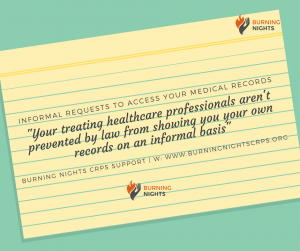 Informal Requests to View Your Medical or Health Records
Informal Requests to View Your Medical or Health RecordsYou may not need to make an official formal application to view your medical records. Your healthcare professionals treating you are not prevented by law from showing you your own records on an informal basis.
You can make an informal request to view your medical records by telephoning the GP practice or hospital or during a consultation. You can then arrange a mutually convenient time to see your records.
If you would like to make a request to access your medical or health records then you need to make the request directly with the healthcare provider who provided the treatment, service or who you visited for CRPS appointments etc. These can include but not limited to:
This request is commonly known as a Subject Access Request or SAR for short and the details are set out in law by the Data Protection Act 1998.
For your medical records that are held by a hospital then you have to contact either the patient services manager or the Records manager at the Trust where the hospital comes under. Please have a look at the list of hospital trusts on the NHS Choices website – list of hospital trusts on the NHS Choices website.
For your medical or health Records held by other health providers such as your GP practice or dentist, then your request has to be made to each of them usually to the Practice Manager. If in doubt please contact the healthcare provider in question and ask for the name or title of the person who deals with Subject Access Requests (SAR).
A Subject Access Request or SAR has a time limit for response which has to be met within 40 (forty) days. However, the healthcare provider should aim to reply to you within 21 (twenty-one) days.
You may not always need to complete an SAR because:
There is no fee if you wish to just view your medical records. However if you wish to take a copy with you then you may be charged. You can however be charged a ‘reasonable fee’ where the request is ‘manifestly unfounded or excessive’.
If there is a charge this may vary and is dependent on how/where the information is stored. However there are maximum charges which are:
Medical (health) records are strictly confidential, therefore if you wish to view other people’s medical records you must have authorisation to do so. There may be many reasons why you want to view other people’s medical records. If you wish to view medical records about someone else then you must:
To access someone else’s medical records then the request must be made directly with the healthcare provider who provided the treatment i.e. optician, dentist, doctor, hospital etc. This is known as the Subject Access Request or SAR. Please see above for further details.
The Primary Care Support England (PCSE) stores medical records of patients who are either not currently registered with a GP practice or who are deceased.
If you want to request access to see your own health records or to see health records of a deceased person then you must complete an application form which you have to download from the PCSE website.
The only records that you can get from the PCSE are GP medical records only. If you wish to see records either relating to private treatment, hospital records or x-rays for example then you need to contact the clinic, hospital or doctor who created them.
There will be a £50 fee that you must provide along with appropriate identification documents and the completed form. You can find the downloadable form via the PCSE website.
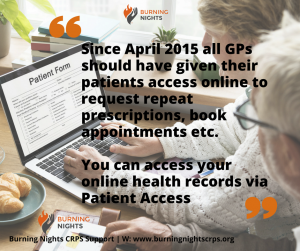 Depending on each GP practice will depend on how you can access your GP records. Some GPs have given their patients online access to their GP records and have done for a while. As part of a Government drive to give you more control over your health and wellbeing, since April 2015 all GPs should have given their patients access online to various things including a summary of your records, booking a GP’s appointment and ordering your repeat prescriptions. You can access this service via Patient Access.
Depending on each GP practice will depend on how you can access your GP records. Some GPs have given their patients online access to their GP records and have done for a while. As part of a Government drive to give you more control over your health and wellbeing, since April 2015 all GPs should have given their patients access online to various things including a summary of your records, booking a GP’s appointment and ordering your repeat prescriptions. You can access this service via Patient Access.
GP practices have a contract with the NHS to allow patients to see key sections of their GP record, including a list of their health problems, allergies, vaccinations, medications and test results. This is all free of charge.
If your GP hasn’t already given you online access and you’d like to access the online services including getting access to your medical information please speak to your GP surgery who will set up an online account and give you the login details. You can then create yourself a new password that you can use to view your medical information.
When you’ve logged into your GP records online via a computer or smartphone there should be several things that you can do including:
Q. Is my information secure?
A. Medical records are already kept on secure computers. It is your responsibility to look after your login details and make sure that you do not give them out to anyone else.
Q. Who else can read my medical records?
A. No-one else sees your records without your consent
Q. Do I have to use the online Records system?
A. No. It is entirely up to you whether you use the system or not
Q. What if I find a mistake?
A. Unfortunately errors do and can occur. If you find any mistakes especially concerning your age, name and contact details or known allergies please contact your GP surgery, tell them the mistake and ask them to correct it.
Q. What if I don’t understand what’s in my records?
A. There are around 1/3rd of people who don’t understand at least some of what is contained in your medical records. If you’re unsure there are links to trusted information sites available or you can contact your GP surgery and ask.
Q. Do I have to pay to see my online medical records?
A. Online access to your GP records is free of charge.
If a child is under 16 years of age, then the person who has parental responsibility will normally be allowed to access the child’s records. However the child’s best interests will usually always be considered.
The child or teenagers can respond to access requests, if the healthcare provider is happy and confident that the child or teenager can understand their own rights.
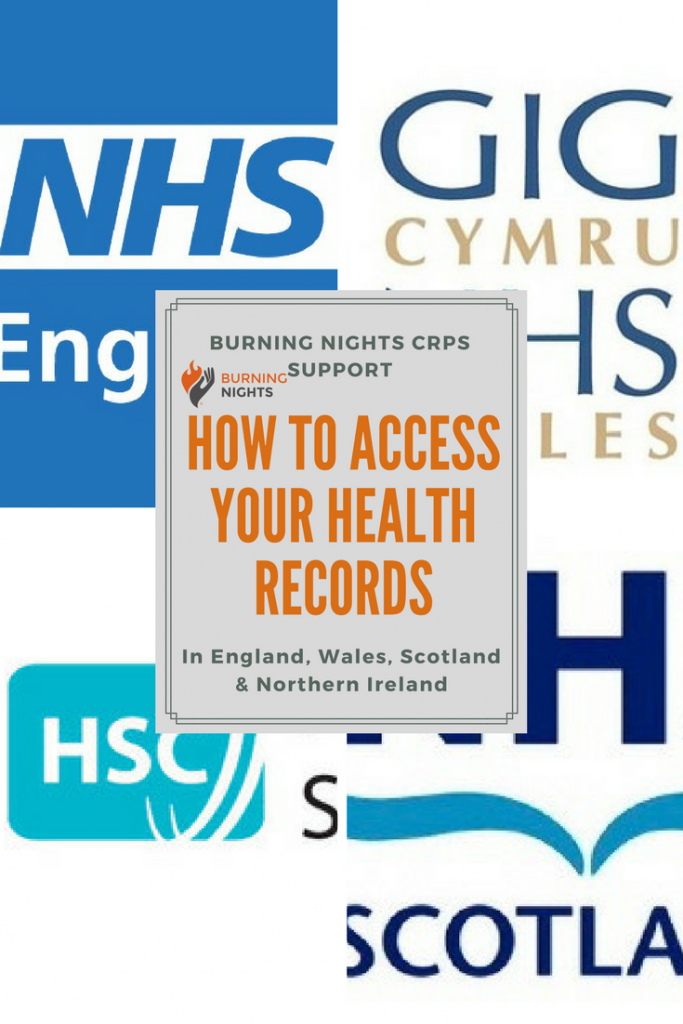
Unfortunately there isn’t just one scheme for accessing medical records that covers the whole of the UK. In most cases, the request for health records will need to be in writing (including by email). Here are the ways to access your medical records in Wales, Scotland and Northern Ireland:
If you wish to access health records that were created within a hospital, you should apply in writing to the hospital that provided your treatment.
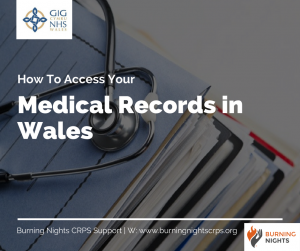 How To Access Your GP Health Records Relating To Living Patients In Wales
How To Access Your GP Health Records Relating To Living Patients In WalesYou are entitled to access your medical or health records under the Data Protection Act (1998), now called GDPR. If you wish to access your health record that has been created by a GP and you are currently registered with a GP, then you will need to contact your GP surgery/practice direct for a copy of your health records. You can make an informal request to view your medical records by contacting the Practice Manager directly. However, practices can insist that you make a formal request in writing, to which they must respond within 40 days
If you are not currently registered with a GP in the UK, i.e. if you are living overseas, in the armed forces or currently imprisoned, your GP health record will stored by the NHS Wales Shared Services Partnership , therefore you will need to contact their local office if you wish to access your GP health records.
When a patient dies, their GP health record is stored by NHS Wales Shared Services Partnership, therefore if you wish to access the GP health records relating to a deceased patient, a representative or next of kin will need to contact their local office. You will also need to complete an application form which is available in Welsh or English. Visit NHS Wales for more information and the relevant application form. http://www.wales.nhs.uk/sitesplus/861/page/45101
The cost of accessing health records can differ, depending on the type of health records you are requesting, i.e. electronic only records will be lower than non-electronic. However, at the time of writing this blog, like NHS England, the maximum fee chargeable is £50.
Visit Access to health records Welsh Assembly and NHS Direct Wales NHS Wales Your Rights for further information
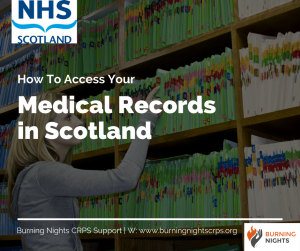 Accessing Your Health Records in Scotland
Accessing Your Health Records in ScotlandHealth Records are exempt from Freedom of Information legislation, and therefore they cannot be requested under the Freedom of Information (Scotland) Act. The Data Protection Act 1998 or DPA 1998, now called GDPR, gives people the right to know what personal information an organisation has about them. To use this right, you can make what is known as a ‘subject access request’ to access your health records in Scotland.
If you wish to access your Health Records, as a general rule you need to contact the person responsible for managing those records at the place where you have been treated. If your treatment took place in a hospital then you will need to contact the Health Records Manager or at your GP practice/surgery then you will need to contact the Practice Manager.
How To Access Your GP or Hospital Health Records Relating To Living Patients In Scotland
To access your health records, you must apply in writing to the Practice Manager at your GP or dental surgeries and the Health Records Manager at hospital.
You don’t need to give a reason for wanting to see or access your health records.
When writing, you should say if you:
(via NHS Inform Scotland)
You may also need to fill in an application form and give proof of your identity. You will usually receive your health records within 40 (forty) days of making your application and paying the applicable cost.
Some information within your health records may be kept from you. NHS staff are not obligated to tell you if this has happened.
You won’t be able to see information that could:
There is a cost to view your health records in Scotland just like the rest of the UK. However you will always be told the cost before you make a decision as to whether or not you wish to access, view or copy your health records.
The current cost to VIEW your medical or health records is as follows:
Records Added Cost
Within 40 days Free
More than 40 days ago Up to £10
The current cost to COPY your medical or health records is as follows:
Records Held Cost
On computer Up to £10
On paper Up to £50
On computer and paper Up to £50
The current law allows you to see health records of a patient that has died as long as those records were made after 1st November 1991. Health records are usually only kept for three (3) years after a person’s death.
The only people who access health records of a deceased person are their personal representative, administrator or executor.
If the deceased person had made it clear that they didn’t want others to access, view or copy their health records after they died, then you won’t be able to access those health records.
Before you get access to these records, you may be asked for proof of your identity and/or proof of your relationship to the deceased person.
Visit NHS Inform Scotland for further information
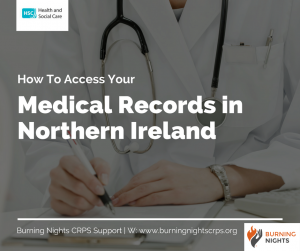 Emergency Summary Health Card
Emergency Summary Health CardIn Northern Ireland there is a health record called Emergency Care Summary Record and healthcare staff treating you in Northern Ireland may consult this health record and can check for this information on the Northern Ireland Electronic Care Record (NIECR).
This health record will contain information and details about your medication and allergies as well as general contact information such as your name, date of birth, gender, address and telephone number. There aren’t any details medical notes in this health record.
The only people who can access the NIECR to view your Emergency Care Summary Record are the health and social care (HSC) staff treating you. However, first they must ask for your permission. The information and details within your Summary Record will allow the treating Doctor or nurse give you the best possible care. The NIECR is only accessible on HSC’s secure network.
You can choose not to have information about your allergies or medications made available to NIECR through the Emergency Care Summary Record. If this is the case then you need to tell your GP practice.
Just as in other parts of the UK, you have a legal right to view health records held about you. You have the legal right to view these records under the Data Protection Act 1998 (DPA 1998). Your Doctor/GP surgery/practice holds your health records. If you have had any treatment in hospital, then the hospital will hold your health records for that. According to the Data Protection Act 1998, the hospital or GP surgery has 40 (forty) days to respond to a request in writing.
If you wish to access your GP health records then you can ask your GP, the Practice Manager or other GP surgery staff or ask your local Health Trust. Although making an informal request is possible it is recommended that you request access in writing i.e. by sending a letter or email if applicable. You may be asked for proof of your identity.
If you wish to access your health records that are held at a hospital, you need to address your letter to your hospital’s Records Manager. If you need your hospital health records in a certain format so you can read and understand them then your records should be that correct format.
Just as in other parts of the UK there will usually be a charge but whether it is your GP surgery or hospital, they will tell you the cost before you submit your request so you can make your decision whether or not to proceed to access your health records.
If you wish to access the health records of a deceased patient in Northern Ireland, you will need to apply either to the deceased person’s GP surgery or their Health Trust under the Access to Health Records (NI) Order 1993.
If you wish to access someone else’s medical (health) records then you will either need a Power of Attorney or their written consent. A Power of Attorney is a legal document that gives another person the legal authority to take actions or make decisions on your behalf. Learn more about the Power of Attorney via NI Direct
Visit NI Direct for further information on accessing health records in Northern Ireland
As you can see, there are some similarities and some slight differences in how to access medical (health) records in the various parts of the United Kingdom. By following the instructions you are given from the organisation you are dealing with, giving all the correct information and providing the right applicable fee, you should have no issues in accessing your medical records. Remember you don’t need a reason nor give a reason why you want to access or receive a copy of your health records. What are your experiences in accessing your medical records in the UK? Let us know in the comments box below. Don’t forget to share our How To Access Your Medical Records blog on social media!
We have a number of other CRPS blogs and chronic pain blogs that you may be interested to read. Here’s just a few articles to start you off.
Written: 30/01/2018
Last Updated: 27/07/2019